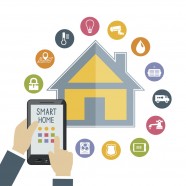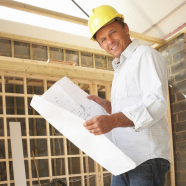How the Internet of Things is Changing New Home Construction
The Internet of Things (IoT) is a pretty bad name for a pretty great set of systems designed to save the average homeowner time and money. When new construction electrical plans include extra time and materials to incorporate smart home technology, it’s a smarter fit than waiting until the technology improves and the homeowner wants to retrofit. Add it into your original home plans, because this technology is only getting more popular.
What is the Internet of Things?
Call it the IoT, smart home technology, or computerized systems, it all means the same thing: a collection of appliances and devices that use wireless technology to speak to each other. This allows for easier maintenance, alerts that prevent expensive accidents, and even big savings on power and even grocery bills. Some of the more popular Internet of Things home additions are:
- Smart TVs. This is probably the most common and well-known example of the technology. Smart televisions allow you to stream movies and television shows, play games, surf the internet, and even download technology updates, right from your television screen. Some can self-diagnose a problem, and all will alert you when they need an update.
- Computerized Refrigerators. They may have seemed a huge indulgence when they first came out, but refrigerators with a computer inside actually make a lot of sense. When kept up-to-date, the inner list function can alert you when you run out of crucial grocery items, preventing wasted time and money. They can also alert you when the temperatures fluctuate, indicating a possible expensive repair problem and enabling you to get it fixed before the problem grows larger.
- Smart HVAC Systems. These environmental systems can sample the air outside and keep track of weather reports to adjust the quality of air inside your home. Electronic thermostats adjust the heating and cooling to make sure each room of your house is at the optimum temperature, no matter what time of the day. Some systems can even be segmented into room-by-room sections and adjust the temperature as needed if the rooms are occupied or empty.
- Smart Lighting. The more smart lighting you have throughout your home, the more money you’ll eventually save on maintenance costs. All electrical systems need to be regularly maintained, but with smart lighting your system can be monitored remotely, with the electrical contractor only coming out when he’s really needed.
- Security. Homes have had security systems installed for decades, but the Internet of Things makes them more accurate and responsive. They’re more able to distinguish between benign visits and criminal occurrences, and can be better embedded into your whole house system, making them more difficult for criminals to shut down.
Installing Internet of Things Technology
All IoT systems rely on wireless connections or local area networks (LANs) for communication. This means installing more robust wiring throughout the house to allow current and future connections to take place. When you compare the cost and trouble of tearing down walls and rebuilding after rewiring, there’s no question that it makes sense to incorporate this technology into new construction electrical plans. Even if you don’t think you’ll ever have any need for smart home technology, having your electrical contractor in south Florida and it makes good financial sense. Most homes are resold eventually, and having your building wired and ready for the Internet of Things can be an impressive selling point for many new buyers.
Read MoreTaking the Mystery Out of New Home Electrical Projects
Building a new home is a massive undertaking. Even when you’re working with great contractors, if you’re like most people, chances are you’ll be overwhelmed by the many steps involved in going from a vacant lot to a building you can live in. When the work gets to things that take a fair amount of technical understanding, like plumbing and electrical, it can get even more confusing.
Here are the steps that are involved in new residential wiring, to take some of the mystery out of the process:
Read MoreNew Construction: Wiring a Smart Home for the Future
Ideally, new homes are built for the future as well as for today. If you’re building a new home, you’re probably planning on staying there for years, if not decades. We’ve gone through a massive surge in electrical and data improvements in the last decade. The next ten to twenty years promise to show us even more. It’s harder to play catch-up if you don’t have the base materials installed. We have no way of knowing exactly what appliances we’ll be using in twenty years, so the smartest move is to include basic variable options in your new construction electrical plan.
Read MoreUnderstanding the Electrical Components of Building a Custom Home
When planning your dream home you’ll probably draw up a portfolio showing new bedrooms, a dedicated outdoor kitchen, or even a fully finished apartment in the basement. Custom homes are exactly what you want them to be, with virtually no rules about what to include. The electrical components of your house plan might seem like the boring part of the project, but new construction electrical details determine how you’ll enjoy your new home throughout the year.
Backup Power
Power outages are a fact of life in southern Florida, between tropical storms, lightning strikes, and aging infrastructures. One of the smartest additions you can make to your custom home plans is elements for a backup power supply and protection from blackout damage. Sudden power outages can endanger computers and other delicate electronics, while prolonged blackouts can cause dangerous heat in the summer and loss of frozen food throughout the year. Some of the additions you may add to your plan are:
- A backup generator. If you’ll only need to power a refrigerator, air conditioner, and some lights, a portable generator may be all you need. For larger power needs such as medical machines and whole-house convenience, this is the time to build in a permanent backup generator.
- Dedicated circuits. With the computers in the house on a separate line, they’re less likely to be damaged from storm-related surges when the power goes out, and also when it comes back on.
- Surge suppressors are good for temporary power outages, preventing large surges of electricity from burning out delicate components.
A high-end circuit breaker is necessary for electronics safety, as are emergency lights for outdoor use during power outages.
Wiring New Construction Electrical Projects
The best time to put wiring into a home is before the walls have been built. You might be thinking of installing cable to multiple rooms in the house, but a fiber optic system will provide lightning fast data for not much more money. As a bonus, fiber optics keep working when the electricity goes out, unlike ordinary cable.
If you work at home, you may want to consider building an ethernet cable into the office or spare bedroom. The wiring for a computer network is also a good idea, even if you don’t think you’ll use it right away. It’s always harder to install residential electrical systems after the fact, and it will sit in the wall, passive, until you decide to start creating the network.
Entertainment
If you’re a movie buff, love your stereo equipment, or you have children, a dedicated entertainment room can be a serious choice. Gather all your equipment into one room that’s equipped with datacomm lines, extra electrical outlets for multiple pieces of equipment, lighting with dimmer switches, and even dedicated outlets for a small refrigerator and popcorn maker. New construction electrical systems don’t have to all be about technical details; sometimes they’re just about making your daily life better.
Lightning Protection
Lightning is a fact of life in Florida, the state that gets more lightning strikes than any other in the country. The odds are good that lightning is going to strike somewhere near your house sometime in the future. Installing lightning rods, or air terminals as they’re called today, is the best way to prevent fire and physical damage to your home when it happens. Today’s lightning protection is so small and subtle you probably won’t notice it when you see it, but it packs a large amount of protection in that little footprint. Most custom homes include elaborate landscaping features, and your new construction electrical contractor can add copper lighting diverter lines connecting the largest trees to the ground, leading dangerous lightning from your treetops to a safe spot away from your home.
Read MoreElectrical Construction: What to Look For in a Licensed Electrician
Every new building, from commercial ventures to new homes, needs a solid electrical construction plan at its core. The professionals you hire begin with electrical blueprints, adding in the plans for wiring, construction, and testing of electrical components. With all the costs related to new construction, you might be considering using a general handyman or builder to take care of your new electrical needs. This can end up costing you more in the end for many reasons, from inefficient wiring plans to outright unsafe electrical systems. Electrical construction professionals have specialized training, and will make sure you get the quality job you need that lasts. When you’re ready to look for a licensed electrician, keep these ideas in mind to help you decide:
The Construction Job
Each licensed electrician is something of a specialist, even if he is proficient with many types of projects. Once you have decided exactly what type of job you need done, look for an electrical professional who specializes in jobs similar to the one you need done. Speak with others in your community who have had similar projects done, and ask for recommendations. Research local companies and ask them for examples of their work that you can look at. Knowing a licensed electrician is experienced with electrical construction jobs similar to yours is the base on which you’ll build a decision on who to choose.
Proficiency
The two most important aspects of an electrical construction job are safety and reliability. Electricians who work on your project must be proficient in these areas, and be trained and recognize the standards of quality and safety. Look for a licensed contractor who:
- Is familiar with the National Electric Code (NEC), which is the recognized safety standard adopted by the majority of local and state building inspection authorities.
- Is licensed, along with all of his employees, in the jurisdiction where your proposed project is to be located. The contractor should be aware that the project will be inspected by authorities in the project’s jurisdiction, who will expect all rules and guidelines laid down by the NEC to be followed.
- Uses quality materials, planning for his project to last for a long period of time.
- Has been adequately trained, and has trained his employees, to ensure a competent and experienced work force to do your work.
Reputation and Reliability
The contractors you consider for your project can have all the experience and knowledge in the world, but if they’re not reliable, honest, and have good business sense, they’ll do you more harm than good. Local contractors may be the best choice, as they’ve made a financial and emotional commitment to your neighborhood. Find business or homeowners in your area who have used this electrical contractor and ask about their experiences. When narrowing down your choices, ask electricians for references and speak with each of them for information about pros and cons for each candidate.
Questions to Ask Licensed Electricians
Make an appointment to interview each prospective electrician before signing any contracts. The information you find out may sway you toward one choice or the other. Find out about each one’s insurance and warranty policy, and ask for it in writing. Check to make sure the electrician will guarantee that all work will be up to code. What is their policy on redoing work that doesn’t live up to quality standards? Can you have a written estimate and a copy of the electrician’s insurance certificate? A good contractor with a solid reputation to uphold will be happy to answer all these questions and provide you with the requested documentation.
Read More





Recent Comments